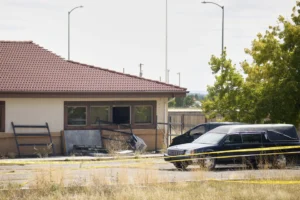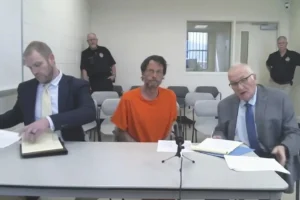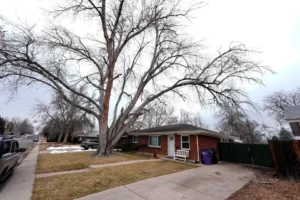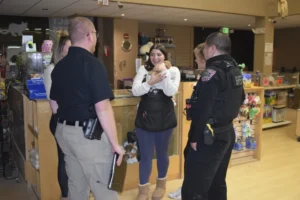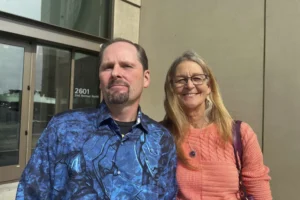NYT Reporter Revisits Unsolved Slaying With ‘The Coldest Case In Laramie’
Hit true-crime podcast delves into 1985 stabbing murder of UW student Shelli Wiley
- Published In: Criminal Justice
- Last Updated: Mar 06, 2023

New York Times reporter Kim Barker recounts her adolescence in Laramie amidst an unsolved murder case in "The Coldest Case in Laramie." (Courtesy photo from Serial Productions)
By Ellen Fike
Special to the Wyoming Truth
A new podcast shines light on a 38-year-old Wyoming murder mystery while also exploring themes of memory, justice and much more.
“The Coldest Case in Laramie” is an audio documentary by Serial Productions and hosted by veteran New York Times reporter Kim Barker. It examines the 1985 unsolved murder of Shelli Wiley, a University of Wyoming student who was stabbed to death in her apartment, which was then set on fire.
Serial Productions is known for its thorough investigations of other unsolved cases, such as the Hae Min Lee mystery featured in the first season of the hit podcast “Serial” in 2015. Adnan Syed, the convicted murderer in that case, was released from prison in 2022, partially due to the reporting in “Serial”, after spending 23 years behind bars. The production company was purchased by the Timesin 2020.

Barker described “The Coldest Case in Laramie” as a “quest story,” one that sees the adult Barker return to Laramie, where she lived as a teen for several years in the 1980s, to figure out why the police investigation of a brutal murder fell apart and went unsolved for decades.
“It really turns into something else, more of a meditation on memory, the stories we tell ourselves, and I think [the show] becomes much grayer by the end,” Barker told the Wyoming Truth. “I’ve meditated on [the case] for a long time, it’s something that really sat with me.”
Stark portrait of Laramie
Despite moving away from Wyoming in her teen years, Barker never forgot the Wiley case. In January 2021, when she was planning her Times projects for the year, it came back to her. “The Coldest Case” was intended to be a side project, something Barker could work on while she tackled her normal beat: policing in America.
In just a week after the podcast dropped all eight episodes online, it’s become one of the most talked-about shows online. Some outlets that have covered the podcast include NPR, The Guardian and Vulture.
But not all of the buzz about “Coldest Case” has been positive. When the trailer for the show dropped in mid-February, some Wyoming residents online did not take too kindly to Barker’s memory of Laramie being a “mean town.”
“I get that true crime relies on painting a picture of grit and rough edges, but Laramie, Wyo. is a pretty lovely place…despite what the [New York Times] says about it,” KUNC reporter Luke Runyon tweeted in late February, just before the podcast was released. “The people I’ve met there happen to be some of the warmest I know, despite the cold weather.”
Still, Barker has tried to engage with anyone who might have misgivings about the podcast, encouraging them to give it a listen before judging her memories of the city too harshly.
“This is how I remember the town,” she said. “It’s a big reason I wanted to go back [to this case], because there was this mean, horrible thing that happened when I was 14 years old, and I want to go take a look at that. I totally get what people are saying when they hear that description of the town, but I try to tell people that what they’re feeling is valid… If they give the show a chance, it ends up being a lot more nuanced.”
After making multiple trips to Laramie with show producer Alvin Melathe, Barker felt comfortable in saying the city is much different than when she lived there nearly 40 years ago.
‘Something visceral’
Barker, Melathe and show executive producer Julie Snyder walked a fine line when reporting and producing the podcast. They wanted to tell an important story about Wiley’s murder and its investigation without making the story salacious. The 30-minute episodes feature interviews with Wiley’s relatives, friends and law enforcement officers, among others.
“[Serial Productions and the Times] were very interested in Kim trying to get the bottom of a ‘cover up’ rather than talking about the murder of a young woman,” Melathe told the Wyoming Truth. “There are things you need to know about the murder, but only in the context of the investigation. It’s tricky.”
Barker hopes that “Coldest Case” listeners will walk away from the series understanding that Wiley was a real person with hopes and dreams—not merely a “popular co-ed,” as she was described in news reports at the time of her murder.
“She was smart. She was a daughter of Laramie. She was one of the only women in her engineering or industrial management classes at UW,” Barker said. “But she was usually described as ‘popular.’ Or she was shamed for dating a Black guy or two, almost like it was a reason to dismiss her, like she deserved what happened to her.”
Melathe wants listeners to consider what “certainty” really means.
“It would be nice if people came away from the show feeling like they might hear something visceral, but they should also sit with that for a second and not immediately assume,” he said. “People start retrofitting their memories around a story that feels seductive and convincing.”
All eight episodes of “The Coldest Case in Laramie” are available via Apple Music, Spotify and other podcast streaming services.


